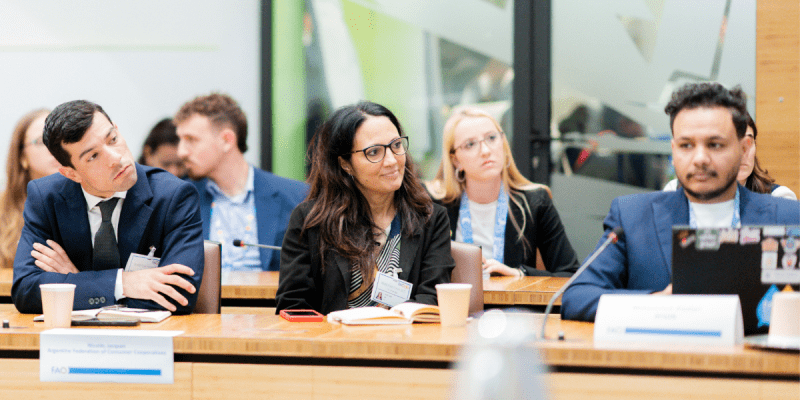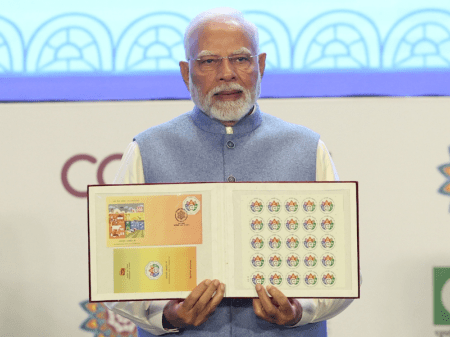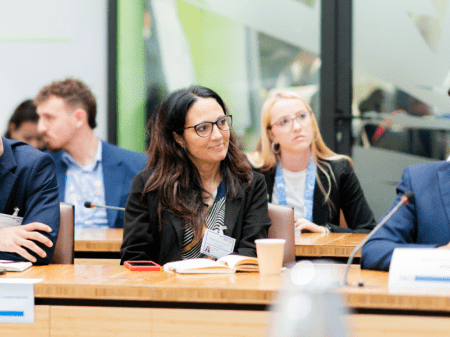
Against the backdrop of growing global calls for fairer, more resilient food systems, the World Food Forum (WFF) convened in Rome, Italy, on 15 October, uniting young leaders, innovators, and changemakers looking to reshape the future of agrifood systems. Held during the 2025 International Year of Cooperatives and coinciding with the 80th anniversary of the Food and Agriculture Organization (FAO), the Forum became a milestone moment for intergenerational collaboration and collective action.
One of the side events, “Seeds of Inclusion,” explored how women- and youth-led cooperatives are driving transformation across the agrifood sector, showcasing how cooperatives create decent jobs, promote equality, and expand access to nutritious food, while empowering new generations of farmers and entrepreneurs. Through open dialogue and real-world case studies, participants examined both the challenges and opportunities of cooperative engagement, and culminated in the co-creation of the Youth Declaration on Cooperatives in Agrifood Systems.
The declaration was developed in the context of the renewed Memorandum of Understanding between the FAO and the International Cooperative Alliance (ICA), with the process bringing together 32 young cooperators aged 18 to 35, representing 26 countries from all regions of the world.
The document emphasises the essential role of youth in shaping inclusive, resilient, and sustainable food systems, noting that “the inclusion of youth in agricultural cooperatives is not a matter of choice but a strategic imperative”. It calls for recognition of youth and women as equal partners in decision-making and as key drivers of innovation, climate action, and social justice.
It highlights the multiple challenges faced by women and young people in the sector, such as restricted access to land, finance, technology, and markets, compounded by gender bias and generational gaps. Bureaucratic hurdles, limited training opportunities, and undervaluation of traditional knowledge further limit participation, while climate shocks, environmental degradation, and lack of access to sustainable technologies and climate finance exacerbate inequalities. Women, in particular, “carry a double burden”, balancing productive and domestic labour.
To tackle this, the declaration outlines strategies to promote leadership, inclusion, and sustainability, and shares regional examples of cooperatives building digital platforms, agribusiness hubs, and educational programs to strengthen youth and women’s representation in governance.
In the Philippines, for example, youth committees now hold board seats in cooperatives; in Europe, the Tarragona Manifesto promotes generational renewal; in India, cooperative education is integrated into school curricula and supported by the YUVA SAHAKAR fund for youth-led projects; in Jordan, new laws reduce registration fees and allocate board seats for women; in Nepal, youth can use educational certificates as collateral for cooperative loans; and in Nigeria and Tanzania, digital agriculture and value addition are drawing young people into the sector. Across regions, youth-led cooperatives use technology such as drones, blockchain, and AI to enhance transparency, efficiency, and sustainability.
The declaration issues nine calls to decision makers, urging governments and international bodies to create enabling environments – through accessible funding, gender-equitable laws, cooperative education, and digital infrastructure – while also committing the movement’s readiness to partner with policymakers and institutions to “build food systems that are more just, inclusive, and sustainable.”
Supporting youth-led cooperatives is “an investment in the present,” it says, as well as “a guarantee of a future rooted in justice and dignity for all”.




